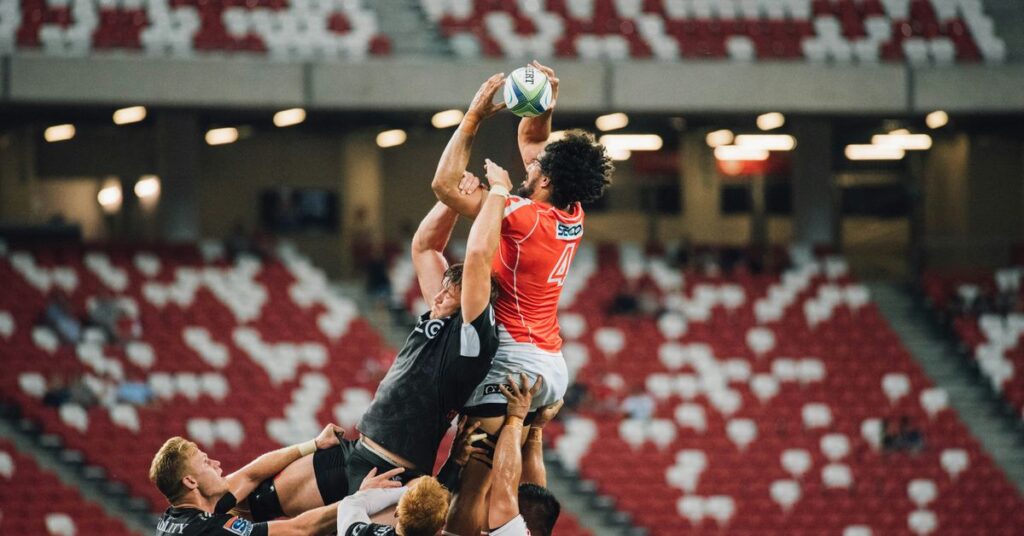Unveiling the Key Strategies That Turned the Tide in Last Night’s Epic Match

Unveiling the Key Strategies That Turned the Tide in Last Night’s Epic Match
Last night, sports fans across the globe witnessed a match that will be etched in memory for years to come. Two titans clashed on the field, with every pass, tackle, and fleeting moment of brilliance leading to a climax that had everyone on the edge of their seats. But what were the key strategies that turned the tide in this epic encounter? As I settled into my seat, popcorn in hand, I couldn’t help but wonder how the narrative of the game would unfold. Spoiler alert: it was quite the rollercoaster ride.
Setting the Scene
The atmosphere was electric, with fans draped in their team colors, faces painted, and a palpable tension hanging in the air. The match kicked off with both teams showcasing their strengths. The home side, known for their aggressive offense, faced off against a formidable visiting team that prided itself on a rock-solid defense. As I glanced around the stadium, I caught snippets of conversations, with fans exchanging predictions and strategies. It was clear that everyone believed in the power of their team, but little did they know how critical strategy would prove to be.
The Early Moves: Establishing Dominance
In the initial minutes, the home team came out guns blazing. Their coach, a master tactician, had clearly emphasized the importance of early control. The first strategy that stood out was their pressing game. They didn’t allow the opposing team to settle into a rhythm. Instead, they pressed high up the pitch, forcing errors and creating opportunities. It struck me that this approach was reminiscent of the tactics employed by legendary teams of the past—think of the relentless energy of early 2000s Barcelona. The players were like hungry wolves, ready to pounce on any sign of weakness.
One standout player, let’s call him “The Maestro,” orchestrated the midfield like a conductor at a symphony. His ability to intercept passes, coupled with quick transitions, set the tone for the home team’s early dominance. I remember thinking, “If they continue at this pace, they might just run away with it.” And the stats backed that up—within the first 15 minutes, they had already recorded three shots on target. The crowd roared, and the energy was almost palpable.
Turning Point: The Shift in Tactics
However, as the match progressed, it became evident that the visiting team wasn’t going to roll over easily. They regrouped, adapting their tactics in response to the early onslaught. One could say it was a classic case of “survival of the fittest.” The coach, a seasoned veteran with a penchant for strategic adjustments, made a pivotal decision: they pulled back a midfielder to bolster the defense, effectively transitioning to a more compact shape.
In hindsight, this was a masterstroke. By sacrificing some attacking flair, they fortified their backline and began to neutralize the home side’s pressing game. I could almost hear the collective sigh of relief from the visiting fans as their team regained composure. It’s fascinating how quickly fortunes can change in football—one moment you’re on top of the world, and the next, you’re scrambling to hold your ground.
Key Substitutions: The Game-Changer
As the clock ticked on, the importance of substitutions became glaringly evident. The visiting team brought on a fresh pair of legs—a young striker known for his blistering pace. It’s always a gamble to introduce new players mid-match, but when executed well, it can tilt the balance in your favor. The young lad, let’s call him “Speedster,” immediately injected energy and urgency into the game.
His pace stretched the home team’s defense, creating space for the midfielders to exploit. Almost like a magician pulling a rabbit out of a hat, the visiting side began to find cracks in the once-impregnable defense. I found myself recalling a similar instance from a match years ago when a substitute turned the tide with sheer determination and speed—a reminder that fresh legs can often spark a comeback.
Pressing vs. Possession: A Tactical Tug-of-War
As the match progressed into the second half, the tactical battle intensified. The home team, having established their initial dominance, now found themselves in a precarious position. The pressing game that had served them so well at the start began to take a toll on their stamina. The visitors, on the other hand, had settled into their strategy of retaining possession and waiting for the right moment to strike. It was like watching a chess game unfold, with each move calculated and deliberate.
The home side’s coach, noticing the shift in momentum, called for a change in tactics. They switched to a more conservative approach, focusing on maintaining possession rather than overwhelming the opposition with aggression. This was a classic example of “if you can’t win the battle, don’t lose the war.” The crowd, while still supportive, seemed to sense that something was amiss. You could almost hear the murmurs of concern echoing through the stands.
The Defining Moments: A Flurry of Goals
And then, like a flash of lightning, the game changed in a matter of moments. The visitors, emboldened by their newfound confidence, launched a counterattack that left the home team reeling. A beautifully orchestrated play resulted in a well-placed cross that found Speedster, who unleashed a volley that sailed into the back of the net. The stadium erupted in disbelief; the once-boisterous home fans were suddenly silenced. I could hardly believe my eyes—it was a stunning goal that showcased the power of swift tactics combined with individual brilliance.
And just like that, the tide had turned. The home team, now trailing, had no choice but to push forward in desperation. Their urgency, however, inadvertently left them vulnerable at the back. It reminded me of a time when I witnessed a similar collapse—when a team pushed too hard, too fast, and opened the floodgates for their opponents.
Defensive Resilience: Holding the Line
In the aftermath of the opening goal, the visitors displayed remarkable defensive resilience. They dug deep, embodying the spirit of tenacity that often defines great teams. Every tackle, every interception, and every block seemed to resonate with the fans who had traveled miles to support them. It was a defensive masterclass, and I couldn’t help but admire their grit.
One particularly memorable moment came when the visiting goalkeeper made a stunning save from a powerful free-kick. The crowd gasped; it was as if time stood still for that brief second. The goalkeeper, with a leap that would make a basketball player envious, denied the home team a chance to equalize. I remember thinking that goalkeepers often don’t get enough credit for their heroics—after all, they’re the unsung heroes who can single-handedly change the course of a match.
Psychological Warfare: The Mental Game
As we entered the final stages of the match, the psychological aspect of the game became increasingly apparent. The home team, once brimming with confidence, now seemed to be battling against their own minds. The weight of expectation, coupled with the fear of failure, cast a shadow over their performance. It’s a phenomenon I’ve seen countless times; the pressure to perform can be paralyzing.
The visitors, on the contrary, thrived under the weight of their newfound lead. They played with a swagger, exuding an air of calm and control. It was almost poetic—the underdogs rising to the occasion while the favorites faltered. I couldn’t help but chuckle at a line I once heard: “In sports, it’s not just about physical prowess; it’s often a battle of wills.”
The Final Whistle: A Lesson in Tactics
As the match drew to a close, the home team threw everything they had into one final push. But the visitors held firm. With every passing minute, the realization that they were on the brink of a historic victory sank in. When the final whistle blew, a wave of jubilation erupted from the visiting fans, while the home supporters were left in stunned silence.
Reflecting on the match, it was clear that several crucial strategies had been employed that ultimately turned the tide. From early aggression to tactical adjustments, from impactful substitutions to mental fortitude, each element played a role in shaping the outcome. It was a reminder that in sports, as in life, adaptability and resilience are paramount.
Concluding Thoughts: The Beauty of the Game
Last night’s epic match will undoubtedly fuel discussions among fans and analysts alike for days to come. The strategies deployed were not merely textbook examples; they were a blend of instinct, experience, and a touch of audacity. I found myself pondering how these lessons could apply beyond the realm of football—after all, isn’t life itself a series of tactical maneuvers?
As I left the stadium, the echoes of the match lingered in my mind. The beauty of sports lies in its unpredictability, and last night was a testament to that. Just when you think you’ve seen it all, a game comes along that reshapes your understanding. Here’s to the next match, the next strategy, and the next unforgettable moment on the field!







